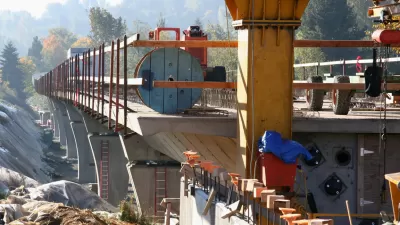The USDOT secretary is making big promises, but an entrenched system makes it difficult to implement long-lasting, systemic change.

Writing in Governing, Jake Blumgart assesses the potential for significant change in the U.S. Department of Transportation as newly appointed secretary Pete Buttigieg champions more diverse modes. "Many of the seemingly groundbreaking gestures the former Democratic presidential aspirant is making, like riding his bike to cabinet meetings or denouncing the racist history of highway policy, have precedent during Barack Obama’s presidency." The department, writes Blumgart, has historically done "little more than overseeing the distribution of funds based on strict formulas that allocate resources to the states." Much of its funding is spent on roadways, and "[m]ost of its tens of thousands of workers are air traffic controllers."
The problem with Democratic administrations, says Beth Osborne, director of Transportation for America, is that "[t]hey have so much confidence that they seem to not feel the need to make actual structural change that will survive them." Former Transportation Secretary Ray LaHood, who served under President Obama, began shifting department policy by prioritizing transit and bike and pedestrian projects through the TIGER (Transportation Investment Generating Economic Recovery) program, but "during Donald Trump’s administration all such spending was eliminated from TIGER’s books." Proposals to implement a Vehicle Miles Traveled (VMT) tax by LaHood and Buttigieg have been rejected by their respective administrations.
President Biden's infrastructure plan, with its "massive allocations for intercity passenger rail, mass transit, and motor vehicle safety," could be "the most dramatic change to federal transportation policy since the 1950s," but supporters worry that the Democrats' tight majority in Congress and the Senate's affinity for compromise could lead to a "dramatically downsized bill."
FULL STORY: Can Pete Buttigieg Really Change Transportation Policy?

Planetizen Federal Action Tracker
A weekly monitor of how Trump’s orders and actions are impacting planners and planning in America.

San Francisco's School District Spent $105M To Build Affordable Housing for Teachers — And That's Just the Beginning
SFUSD joins a growing list of school districts using their land holdings to address housing affordability challenges faced by their own employees.

The Tiny, Adorable $7,000 Car Turning Japan Onto EVs
The single seat Mibot charges from a regular plug as quickly as an iPad, and is about half the price of an average EV.

Seattle's Plan for Adopting Driverless Cars
Equity, safety, accessibility and affordability are front of mind as the city prepares for robotaxis and other autonomous vehicles.

As Trump Phases Out FEMA, Is It Time to Flee the Floodplains?
With less federal funding available for disaster relief efforts, the need to relocate at-risk communities is more urgent than ever.

With Protected Lanes, 460% More People Commute by Bike
For those needing more ammo, more data proving what we already knew is here.
Urban Design for Planners 1: Software Tools
This six-course series explores essential urban design concepts using open source software and equips planners with the tools they need to participate fully in the urban design process.
Planning for Universal Design
Learn the tools for implementing Universal Design in planning regulations.
Smith Gee Studio
City of Charlotte
City of Camden Redevelopment Agency
City of Astoria
Transportation Research & Education Center (TREC) at Portland State University
US High Speed Rail Association
City of Camden Redevelopment Agency
Municipality of Princeton (NJ)





























